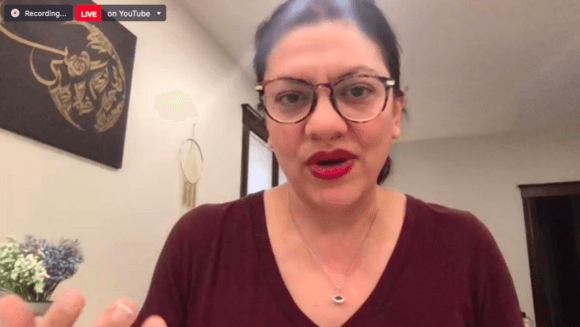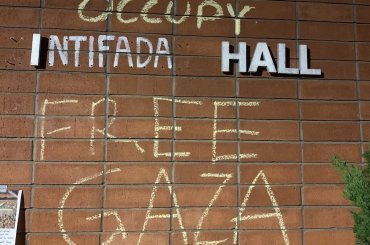On Sunday, Rep. Rashida Tlaib (D-MI) celebrated Passover with more than 80 people in Detroit and across the country. The ceremony was organized by Jewish Voice for Peace Action and titled “Jews for Rashida.”
“As we hold this seder,” said Tlaib, “we center ourselves around humanity. We center around our incredible ancestry. And as we build up this movement, we have the strength of leaning on each other. We are going to out-work them, we are going to out-love them, and no one will feel less-than anymore.”
Ready for #jewsforrashida Seder with @JvpAction starting at 6:30 east. https://t.co/Tq1J5FPll7 pic.twitter.com/n1CUiAlO4U
— Rabbi Alissa Wise (@AlissaShira) April 12, 2020
“Jews and allies for Rashida in Detroit are tired of profits, greed, and unchecked power being put before people. Last night was a demonstration of the strength of our community and an invitation to join us in the fight ahead.” said JVP Action Organizer Reuben Telushkin after the event, “The challenges faced by Palestinians are all too familiar to many Detroiters, who also contend with severe economic and racial injustice — and the horrifying ways those inequalities accelerate infection right now.”
“The only remedy for the darkness of the moment we face is action. It was inspiring and beautiful to gather together to share ritual and community with Congresswoman Tlaib and to commit to working together to envision and fight for a better, more just world,” said JVP Action Government Affairs Manager Beth Miller, “Our base of Jews and allies in Detroit are ready for this fight, and we’re ready to get Congresswoman Tlaib re-elected.”
Tlaib is facing a primary challenge this year from Detroit City Council President Brenda Jones. A Target-Insyght poll from earlier this month showed Jones making a massive gain, but still trailing Tlaib by 9 percentage points.
You can watch the entire Passover Seder on Facebook:



A little glimmer of hope – but unfortunately all too little. One wishes Rep Tlaib the very best and Palestinians even more of goodness.
A most welcome and uplifting article. Thank you!!
“’As we hold this seder,” said Tlaib, ‘we center ourselves around humanity. We center around our incredible ancestry. And as we build up this movement, we have the strength of leaning on each other. We are going to out-work them, we are going to out-love them, and no one will feel less-than anymore.'”
Rabbi Menachem Froman, chief rabbi of the West Bank settlement of Tekoa, and a champion of inter-religious reconciliation: “‘[E]very Jew who learns the writings of the great sages – who, at the head of them all stands Maimonides – knows that our great thinkers wrote in the Arabic language, lived in Islamic states and participated with the great Muslim thinkers in the effort to explain the words of God, according to the paths of the sages and amidst the difficult bloody battles that we have had since the beginning of Zionism with the Muslims…. We know… that the war between the Jews and the Muslims is the work of the cursed devil. We know that Islam is named after peace.'” (Haaretz, September 18, 2006)
Dr. Ella Habiba Shohat, Professor of Cultural Studies and Women’s Studies at the City University of New York (CUNY), a self described ‘Arab Jew’ born in Israel of Iraqi ancestry now living in the United States: “‘Our history simply cannot be discussed in European Jewish terminology. As Iraqi Jews, while retaining a communal identity, we were well integrated and indigenous to the country, forming an inseparable part of its social and cultural life. Thoroughly Arabized, we used Arabic even in hymns and religious ceremonies. The liberal and secular trends of the 20th century engendered an even stronger association of Iraqi Jews and Arab culture, which brought Jews into an extremely active arena in public and cultural life.'”
“Prominent Jewish writers, poets and scholars played a vital role in Arab culture, distinguishing themselves in Arabic speaking theatre, in music, as singers, composers, and players of traditional instruments. (“Reflections by an Arab Jew” – http://www.bintjbeil. com/E/occupatio n/arab_jew.html )
“So, what did the Muslims do for the Jews? – How Islam Saved the Jews.”
Lecture by Professor David J Wasserstein.
David J Wasserstein is the Eugene Greener Jr. Professor of Jewish Studies at Vanderbilt University. This article is adapted from his May, 2012, Jordan Lectures in Comparative Religion at the School of Oriental and African Studies.
Excerpt:
“Islam saved Jewry. This is an unpopular, discomforting claim in the modern world. But it is a historical truth. The argument for it is double. First, in 570 CE, when the Prophet Mohammad was born, the Jews and Judaism were on the way to oblivion. And second, the coming of Islam saved them, providing a new context in which they not only survived, but flourished, laying foundations for subsequent Jewish cultural prosperity – also in Christendom – through the medieval period into the modern world.”
Ech, I can’t remember the last time you left a comment on MW that wasn’t an expression of hatred, usually (but not always) toward Jews in general of someone who was Jewish in particular, often seasoned with sarcasm. I’d hate to be a neighbor or co-worker of yours in real life.
Misterioso, thank you for the concrete and specific information you offer so much of the time in these commentary sections. It’s a refreshing contrast to the invective others offer.
jrg, et al
Clarification:
In my reply to ech, I correctly described Rabbi Froman as “Palestinian born.”
To be precise, he was born in 1945 in Galilee, British mandated Palestine.
jrg, isn’t it more important to engage with the substance of ech’s comment rather than focussing only on his tone?
As I read it, he’s pointing out the peculiar coexistence of wildly disparate attitudes in Rabbi Froman’s remarks – extolling the virtues of conciliation while taking part in acts of apartheid and dispossession.
Some see this sort of thing as normalizing the intolerable, some think that justice is far more important than conciliation, some think the problem’s not religion (Christian Palestinians suffer, too) and that focusing on religious conciliation obscures the political nature of oppression.
You may not agree with these perspectives, but attending to them and not ech’s sarcasm would be more fruitful, I think.
I’m not aware of ech’s expressing hatred towards Jew in general, being more of an outsider here and not part of the handful who produce the vast majority of comments, but if you’re right, I completely stand with you on that aspect of your comment. It’s hard for me to imagine, though, that in a moderated comment section of a website like this, antisemitism would be tolerated.